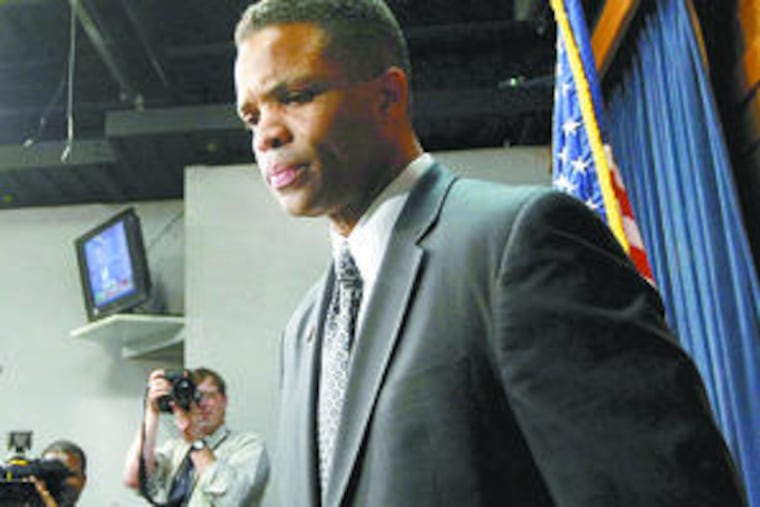Illinois governor faces rising calls to resign
Obama, Democrats in Senate add their voices.

CHICAGO - Amid one of the most brazen Illinois corruption case in years, President-elect Barack Obama and the entire Senate Democratic caucus called on Gov. Rod R. Blagojevich yesterday to resign, while Rep. Jesse Jackson Jr. said he did nothing wrong in seeking a Senate appointment from the governor.
Jackson said that while he may be "Senate Candidate 5" in the 76-page affidavit filed Tuesday in support of corruption charges against Blagojevich, a fellow Democrat, he had "no involvement whatsoever in any wrongdoing."
The criminal complaint quotes the governor as saying that an emissary from Candidate 5 had offered to raise $500,000 for Blagojevich's campaign treasury. Jackson said at a news conference, "I never sent a message or an emissary."
Jackson, the son of civil rights activist Jesse Jackson, said the office of U.S. Attorney Patrick J. Fitzgerald told him Tuesday that he was "not a target of this investigation." A spokesman for Fitzgerald's office declined to confirm or deny that assertion.
Barely 24 hours after FBI agents led Blagojevich away in handcuffs, the governor returned to work in his downtown Chicago office without speaking to reporters and without giving any indication of his plans.
His refusal to step aside after allegations that he sought to sell the Senate seat vacated by Obama led to blunt calls for his ouster.
All 50 members of the Senate Democratic caucus signed a letter urging Blagojevich to quit immediately and allow his successor to appoint Obama's replacement. Senate Majority Leader Harry Reid (D., Nev.) warned that the Senate leadership might not seat anyone Blagojevich picks, because such an appointee "would be under a cloud of suspicion."
Robert Gibbs, the incoming White House press secretary, said Obama thought Blagojevich should step down because under the circumstances, "it is difficult for the governor to effectively do his job and serve the people of Illinois."
Obama, Gibbs said, thinks the Illinois General Assembly should "put in place a process to select a new senator that will have the trust and confidence of the people of Illinois."
'The only option'
Not waiting for Blagojevich to act, Illinois legislators began drafting a bill to strip the governor of the authority to name the new senator. They are expected to meet in Springfield on Monday to approve a special election to fill the final two years of Obama's term.
State House leader Michael Madigan, and State Senate President Emil Jones Jr., both Democrats, expect approval within days. Madigan spokesman Steve Brown said, "There appears to be widespread sentiment that this is the only option that Illinois has to fill that vacancy."
Yet the bill to strip the governor's authority could not become law without his signature. If he remains in office, he could approve the bill, veto it, send it back to the legislature, or do nothing for 60 days.
"I urge you to search your heart and summon the strength to put your state and your nation above any personal considerations," Sen. Richard J. Durbin (D., Ill.) wrote in a letter to Blagojevich, who was captured on FBI tapes declaring that he would base his selection of Obama's successor on "our legal situation, our personal situation, my political situation."
'500 grand'
According to the federal affidavit, Blagojevich on Dec. 4 told an adviser: "We were approached 'pay-to-play,' that, you know, he'd raise me 500 grand. An emissary came. Then the other guy would raise $1 million if I made [Candidate 5] a senator."
The same day, Blagojevich allegedly told his top fund-raiser he was "elevating" Candidate 5 on the list of possible Senate picks. He said he was due to meet the candidate in a few days and might be able to get something "tangible up front."
Blagojevich instructed the fund-raiser to pass the word that if Candidate 5 wanted the job, "some of this stuff's gotta start happening now . . . and we gotta see it. You understand?"
At a Capitol Hill news conference yesterday, Jackson said: "I reject and denounce pay-to-play politics and have no involvement whatsoever in any wrongdoing. I did not initiate or authorize anyone at any time to promise anything to Gov. Blagojevich on my behalf."
Jackson, recently elected to his eighth term from Chicago's South Side, said that he met with Blagojevich for 90 minutes Monday - the day before the governor's arrest - to discuss his qualifications for the Senate appointment.
He promised to cooperate "fully and completely" with federal investigators. Earlier, his attorney, James Montgomery Sr., held a news conference to say that Jackson "has made no illicit approach to the governor."
"Politicians and fund-raisers do some funny things from time to time," he said. "I wouldn't put it past someone to claim they were representing Congressman Jackson."
Patrick Collins, a former public-corruption prosecutor who helped convict Blagojevich's predecessor, former Republican Gov. George Ryan, said the prosecution has 30 days to obtain a grand jury indictment. He said the tapes and other materials presented in the criminal complaint would not be enough to prove in court that Blagojevich, chief of staff John Harris, and others they spoke with intended to break the law.
"They have to develop evidence beyond a reasonable doubt," Collins said. "They need financial records, they need phone records, they need witness testimony. They need insiders in the Blagojevich camp to say, 'I had this conversation and I was the emissary.' "
Bob Greenlee, one of Blagojevich's deputies, resigned yesterday. It remained unclear whether Greenlee, 33, was the person identified in the affidavit as "Deputy Governor A," who discussed with Blagojevich a series of alleged schemes to line the governor's pockets.